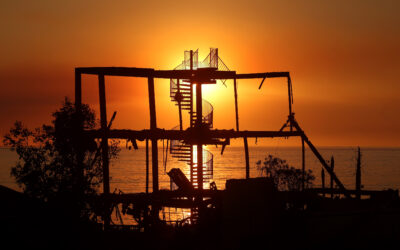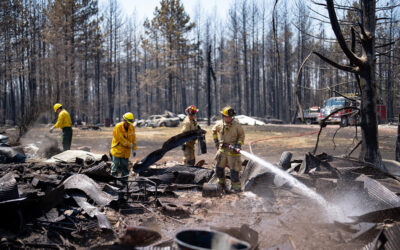Rules fast-track projects to benefit logging, grazing and mining

FILE – In this Aug. 15, 2019, file photo, is a juniper tree cut down as part of a giant project to remove junipers encroaching on sagebrush habitat needed by imperiled sage grouse in southwestern Idaho. Conservation groups are blasting a Trump administration decision streamlining environmental reviews of timber salvage projects and cutting down pinyon-juniper woodlands on millions of acres in the U.S. West. WildEarth Guardians, Western Watersheds Project and seven other groups say the rules approved Thursday, Dec. 10, 2020, fast-track projects to benefit logging, grazing and mining while eliminating public comments. (AP Photo/Keith Ridler, File)
By KEITH RIDLER Associated Press
BOISE, Idaho (AP) — Conservation groups are blasting a Trump administration decision officials said will reduce wildfires by streamlining environmental reviews of timber salvage projects.
WildEarth Guardians, Western Watersheds Project and seven other groups say the rules approved Thursday fast-track projects to benefit logging, grazing and mining while eliminating public comments. The new rules also speed the cutting down of pinyon-juniper woodlands in the U.S. West.
The Trump administration said the streamlined reviews on land administered by the U.S. Bureau of Land Management will reduce wildfire threats while increasing job opportunities. The administration also said the new rules will help protect sagebrush habitat needed by imperiled sage grouse and other wildlife.
Specifically, the administration finalized what are called categorical exclusions to the National Environmental Policy Act. That’s a 1970 law that typically requires federal agencies to study potential environmental effects of proposed actions before starting work.
“After yet another difficult fire season, it is measures like this that will help (the Bureau of Land Management) better protect human life and property by aggressively addressing dead and dying timber and pinyon-juniper encroachment, and I hope to see it used immediately to reduce fuel loads before next summer,” Kate MacGregor, deputy secretary of the U.S. Department of the Interior, said in a statement.
But the environmental groups said the change would mean little oversight by the public on giant projects.
“These are scorched-earth policies with no place in what is supposed to be open, transparent, and science-based management of 245 million acres of public land,” said Kya Marienfeld, Wildlands Attorney with the Southern Utah Wilderness Alliance.
The National Interagency Fire Center in Boise, Idaho, said that nearly 15,000 square miles (39,000 square kilometers) have burned in the U.S. this year, about 4,700 square miles (12,000 square kilometers) more than the 10-year average.
The bureau administers 380,000 square miles (900,000 square kilometers) of land in the U.S. West, where deadly fires have forced evacuations and damaged homes. In California, over 6,250 square miles or 16,000 square kilometers burned this year, more than double the previous record for the most land burned in a single year in the state — roughly the size of Connecticut. Deadly Northwest fires burned hundreds of homes.
Experts say there is a link between climate change and bigger wildfires, but President Donald Trump has blamed poor forest management.
The new policy also includes categorical exclusions allowing the cutting of pinyon-juniper forests. Federal agencies say the trees are encroaching on sagebrush habitat and need to be removed. The bureau has already cleared large areas of such forests in several states, and plans call for more cutting of trees.
The bureau’s “notion that there will be no significant environmental impacts from clearcutting thousands of acres across the West is absurd on its face,” said Scott Lake of the Center for Biological Diversity. “This is nothing more than an eleventh-hour attempt by the outgoing administration to shut the public out of public land management.”
The new rules can be reversed, but changes would need to go through a public comment process.
Experts say that pinyon pine and junipers, which are native species, have been expanding the amount of area they cover for decades, creating woodlands and eliminating understory species such as sagebrush. Studies in some areas have found the expansion dates back more than a century.
Experts attribute the expansion to fire suppression, domestic livestock grazing and climate change. But studies also indicate that pinyon-juniper forests have expanded and receded based on climate for thousands of years.
All contents © copyright 2020 The Associated Press. All rights reserved.




